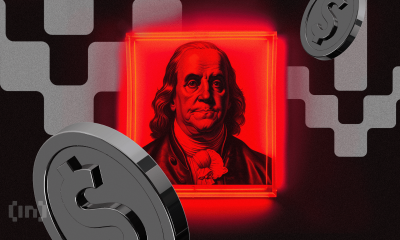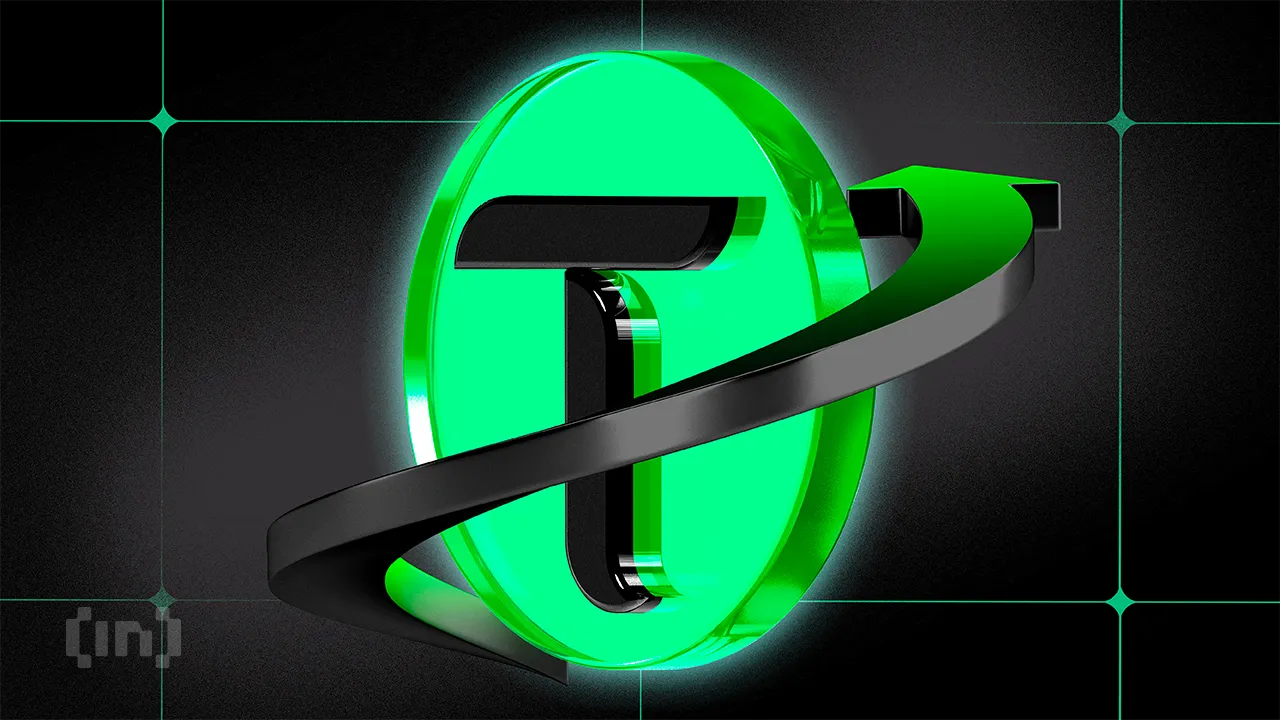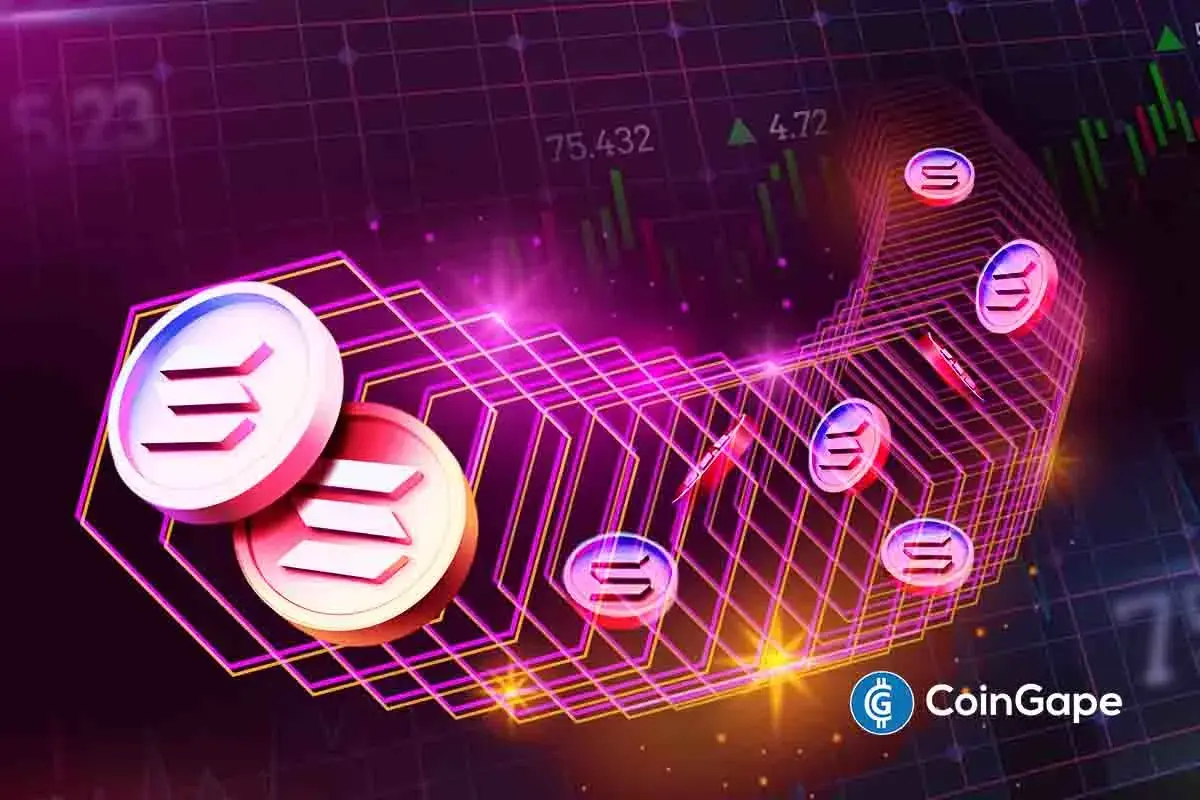Bitcoin
This Is Why Mt. Gox Won’t Trigger Major Bitcoin Sell-Off

Analyst predicts less market turmoil than initially feared as Mt. Gox begins repayments to creditors in July 2024. This development is pivotal for the cryptocurrency market, which recently saw significant volatility.
Once a leading Bitcoin exchange, Mt. Gox faced bankruptcy in 2014, leaving thousands of creditors in limbo.
Analyst Estimates That Mt. Gox Creditors Will Sell Only 6,500 BTC
As the trustee announced the commencement of repayments, the market responded with a sharp drop in Bitcoin prices, plunging to $58,500. Bitcoin visited this level for the first time after May 3. However, the price quickly rebounded to above $61,300, showcasing the resilience of the crypto market.
Despite the initial panic that triggered over $360 million in liquidations within 24 hours and continued outflows from Bitcoin ETFs, the anxiety seemed short-lived.
Read more: Top Crypto Bankruptcies: What You Need To Know

Alex Thorn, Galaxy’s head of research, offers an analysis that counters the prevailing market sentiment. According to Thorn, the actual impact of the Mt. Gox distribution on Bitcoin’s selling pressure might be overestimated.
“Creditors have been stuck in Mt Gox bankruptcy for 10+ yrs. Finally, Trustee says the in-kind distribution of Bitcoin and Bitcoin Cash will begin in July. We think fewer BTC will be distributed than people think and that it will cause less Bitcoin sell pressure than market expects,” Thorn explained.
He bases his assessment on comprehensive reviews of bankruptcy filings and discussions with creditors.
Historical data reveals that Mt. Gox lost approximately 940,000 BTC, recovering only 15% (141,868 BTC). These assets, initially valued at around $63.9 million, have now ballooned in value to about $9 billion due to Bitcoin’s price increase. Despite the substantial potential for profit, the conditions of the payout might encourage creditors to hold onto their assets rather than sell.
Thorn outlined several reasons why individual creditors might resist selling their newly acquired Bitcoin.
“Many of these creditors are long-term Bitcoiners, early adopters who are technologically adept and have previously rejected aggressive offers to liquidate their claims for cash,” he noted.
Additionally, the significant capital gains on these assets would mean hefty taxes for those opting to sell.
After deductions for early payouts, individual creditors will receive approximately 65,000 BTC. Moreover, even if a fraction, approximately 10%, of the 65,000 BTC distributed to individual creditors were to be sold, this would represent just 6,500 BTC entering the market. This is far less disruptive than market fears suggest.
Read more: Bitcoin (BTC) Price Prediction 2024/2025/2030
Most of these BTC are set to be deposited directly into accounts at crypto exchanges like Kraken and Bitstamp, where the infrastructure is already in place to handle such transactions seamlessly. Meanwhile, many others believe that reasons other than Mt. Gox’s redistribution panic have also contributed to Bitcoin’s dip.
“Bitcoin is the best alarm system in markets today. This price dump is probably less about Mt. Gox coins being sold and more about some liquidity crisis on the horizon that is metastasizing behind the scenes,” Marty Bent said.
Disclaimer
In adherence to the Trust Project guidelines, BeInCrypto is committed to unbiased, transparent reporting. This news article aims to provide accurate, timely information. However, readers are advised to verify facts independently and consult with a professional before making any decisions based on this content. Please note that our Terms and Conditions, Privacy Policy, and Disclaimers have been updated.
Bitcoin
Dollar Dips While Bitcoin Hits New Heights

The US Dollar Index (DXY) has dropped to a three-year low amid reports that President Donald Trump is considering removing Federal Reserve Chairman Jerome Powell.
Meanwhile, the development positively affected Bitcoin’s (BTC) price, pushing it to its highest level since President Trump’s Liberation Day.
Trump’s Push Against Powell Adds Pressure on the Dollar
According to the latest data, DXY has plunged below 99. At press time, it stood at 98.2, representing the lowest value since March 2022.

Economist Peter Schiff highlighted the severity of the situation in the latest post on X (formerly Twitter).
“Gold is up over $50, hitting a record high of $3,380. The euro is above $1.15. The dollar has also fallen below 141 Japanese yen and .81 Swiss francs (a new 14-year low, just 3% above a record low). The dollar Index is below 98.5, a new three-year low. This is getting serious,” Schiff posted.
The dollar’s steep fall comes amid the latest comments made by National Economic Council Director Kevin Hassett on Friday, April 18. Hassett revealed that Trump and his team are actively exploring the possibility of ousting Powell.
His statement was in response to a reporter’s question about whether removing Powell was an option.
“The president and his team will continue to study that matter,” Hassett replied.
In addition, he called out the Federal Reserve for politically motivated actions under Powell’s leadership. Specifically, Hassett criticized the Fed for raising interest rates shortly after Trump’s election and cutting them ahead of the election, moves he claims favored the Democratic Party.
Notably, the growing contempt towards Powell is a response to the Fed’s stance on interest rates. BeInCrypto reported earlier that the Fed will likely not cut rates in May amid rising inflation and President Trump’s tariff pause.
Recently, Trump also blamed the Fed Chair for being slow to act on interest rate cuts. In a post on social media, Trump compared Powell’s actions unfavorably to the European Central Bank (ECB), which is set to implement its seventh interest rate cut.
Trump argued that Powell, whom he described as “always too late and wrong,” should have taken similar measures long ago to address economic conditions.
“Powell’s termination cannot come fast enough!” the President wrote.
The Fed Chair’s potential removal raises serious questions about the Federal Reserve’s independence and its implications for global markets. Powell, whose term as chair extends to May 2026, has previously stated that legal protections prevent his removal and that he intends to serve out his term.
Will Dollar Weakness Drive Bitcoin to New Heights?
Nonetheless, it’s worth noting that if Powell is removed and President Trump successfully persuades the Federal Reserve to cut interest rates, it could likely lead to a crypto market rally. Generally, when the Fed lowers interest rates, the US dollar tends to weaken.
Therefore, investors prefer cryptocurrencies, especially Bitcoin, which is often seen as a hedge against inflation and the weakening of fiat currencies. The inverse relation between the DXY and BTC further solidifies the case for a rally if the dollar depreciates.
In fact, the latest decline in the dollar index has coincided with a notable increase in Bitcoin’s price. The largest cryptocurrency surged to over $87,000 for the first time since April 2.
“USD weakness is driving the rally in crypto,” Sean McNulty, Derivatives Trading Lead at FalconX, told Bloomberg.
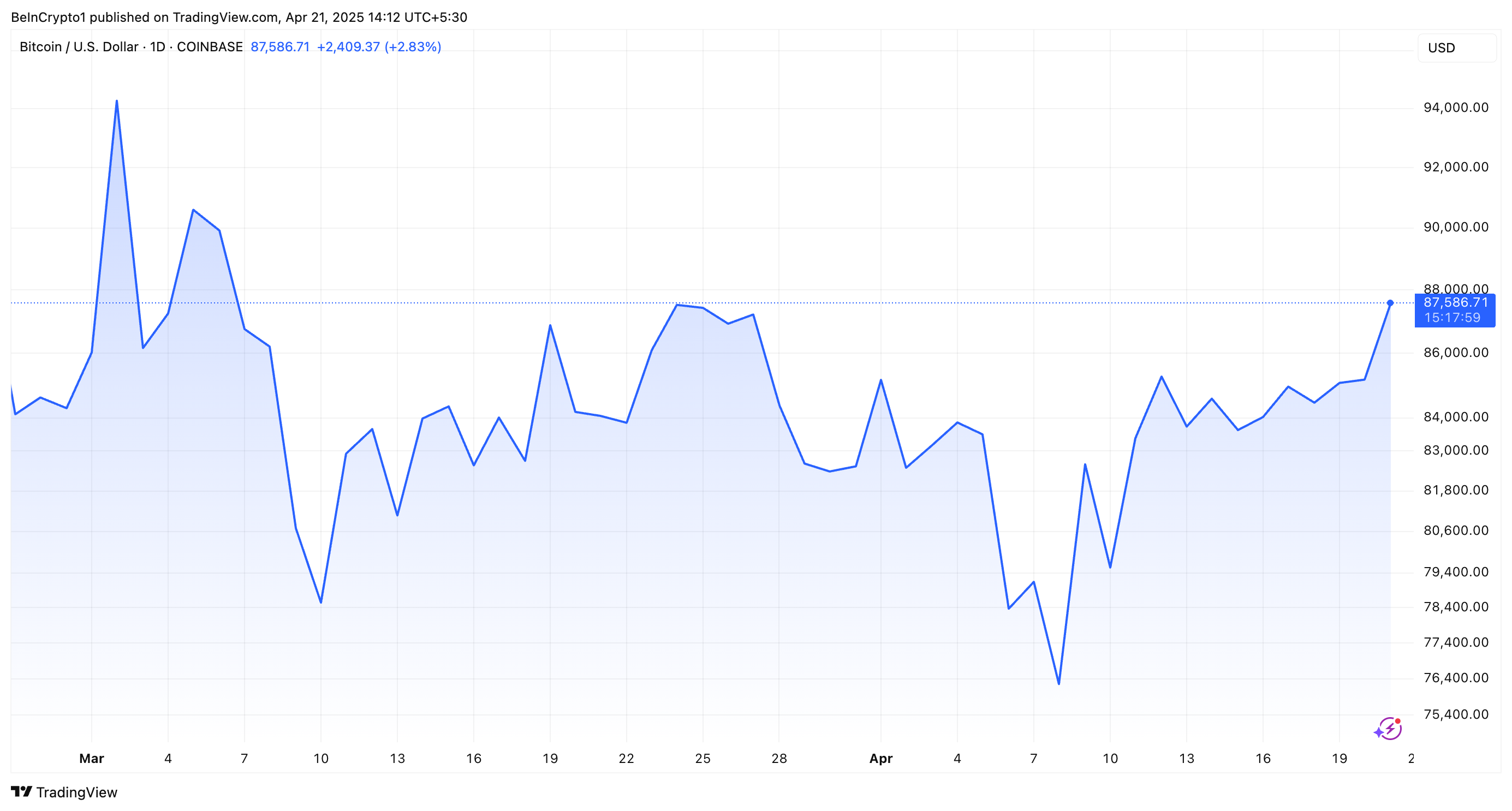
At the time of writing, BTC was trading at $87,586. BeInCrypto data showed that this represented an appreciation of 3.5% over the past day. As markets celebrate these gains, the focus remains on Trump’s next moves and their broader economic consequences.
Disclaimer
In adherence to the Trust Project guidelines, BeInCrypto is committed to unbiased, transparent reporting. This news article aims to provide accurate, timely information. However, readers are advised to verify facts independently and consult with a professional before making any decisions based on this content. Please note that our Terms and Conditions, Privacy Policy, and Disclaimers have been updated.
Bitcoin
Solana, Bitcoin in Texas, and Initia

Several top crypto news stories are in the lineup this week in crypto, spanning various ecosystems with the potential to drive volatility.
This week, traders looking to capitalize on event-specific volatility should monitor the following developments.
This week, the Solana Community Conference, or Breakpoint, is among the top crypto news stories. It kicks off on April 25 and is Solana’s flagship gathering of developers, investors, and innovators.
Historically, Solana Breakpoint is a stage for major announcements, such as new project launches, partnerships, or technological advancements. In recent years, key announcements in similar gatherings have included the Solana Seeker phone or the Firedancer validator client.
According to Solscan data, Solana’s ecosystem boasts nearly 4 million active wallets. Meanwhile, DefiLlama data shows up to $7.37 billion in total value locked (TVL). With these numbers, the Solana community conference could drive positive sentiment for SOL, which was trading at $141.05 at press time.
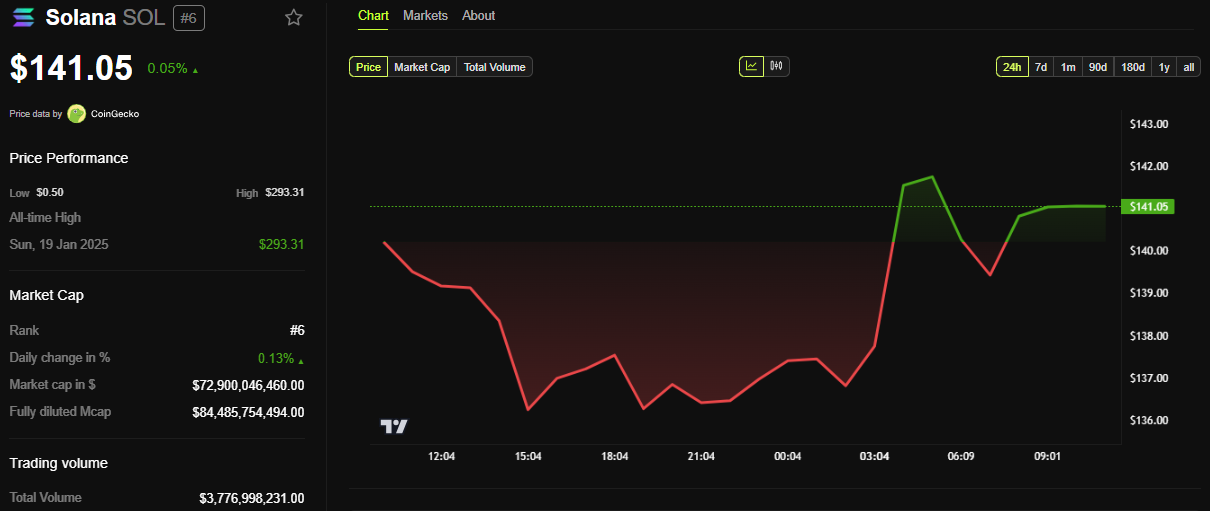
Traders should brace for potential price volatility, as positive news could spark short-term spikes. In the same way, any underwhelming news or network concerns, like past outages, might temper enthusiasm.
Texas Bitcoin Reserve Hearing
Another top crypto news story this week concerns a strategic crypto reserve. On April 23, Texas will hold a strategic Bitcoin reserve hearing, marking a significant event given the state’s pro-crypto stance.
The bill, introduced four months ago, passed the committee with a 9-0 vote and received senate approval with 80% support. Similarly, Dan Patrick, Lieutenant Governor for the State of Texas, listed Bitcoin Reserve as a top priority for 2025.
“My statement announcing the first round of top 40 priority Bills for the 2025 legislative session,” he shared on X (Twitter) in January.
Against these backdrops, the Wednesday hearing could clarify Texas’s approach to institutional Bitcoin adoption. This could set a precedent for other states or federal policy.
A favorable outcome might bolster Bitcoin’s legitimacy, driving demand from institutional investors and positively influencing the BTC price.

Initia’s Mainnet and INIT Token Launch
Also in the headlines, this week in crypto, Initia’s mainnet launch and its token, INIT, debut on Thursday, April 24. This comes after the network revealed a 50 million token airdrop three weeks ago.
The Thursday event will mark a key milestone for the layer-1 blockchain, which is focused on interoperability and user experience. The launch could attract attention from decentralized finance (DeFi) and cross-chain enthusiasts, as Initia aims to simplify dApp interactions.
For traders, INIT’s initial price action will be critical, as new token launches often experience high volatility due to speculative trading.
“Initia INIT Binance Spot Listing Date Announced! Listing on: 24th April 2025. Mainnet will also officially launch on the same day. Airdrop claim date and exact time are yet to be announced,” the network stated recently.
Investors should evaluate Initia’s partnerships and developer adoption, as its success hinges on ecosystem growth.
Injective’s Lyora Mainnet Upgrade
Injective’s Lyora mainnet upgrade, scheduled for Tuesday, April 22, aims to enhance network performance and transaction speed. It would strengthen its position as a DeFi-focused layer-1 chain.
“The Injective Lyora Mainnet is nearly here! Vote today to dramatically enhance Injective infrastructure, performance, and transaction speeds. The official launch is on April 22,” Injective said.
This upgrade could improve user experience and attract developers to Injective’s ecosystem, particularly for derivatives and trading platforms.
Traders should watch INJ’s price for short-term momentum, as successful upgrades often drive positive sentiment.
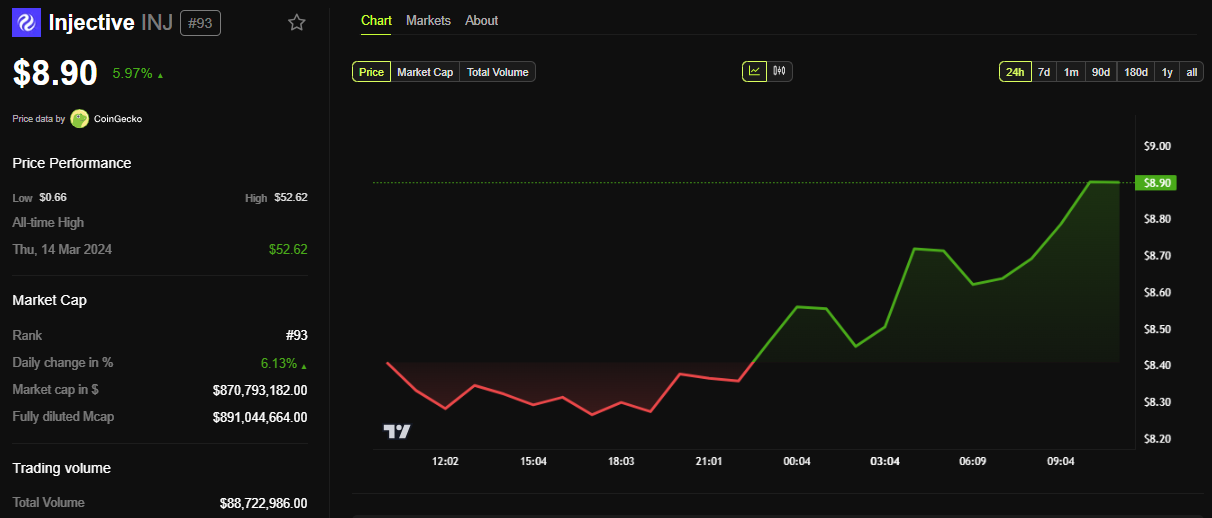
At the same time, investors should consider Injective’s growing TVL (total value locked) and partnerships, like its collaboration with Sonic for AI agent platforms, as indicators of long-term potential.
Disclaimer
In adherence to the Trust Project guidelines, BeInCrypto is committed to unbiased, transparent reporting. This news article aims to provide accurate, timely information. However, readers are advised to verify facts independently and consult with a professional before making any decisions based on this content. Please note that our Terms and Conditions, Privacy Policy, and Disclaimers have been updated.
Bitcoin
US Economic Indicators to Watch & Potential Impact on Bitcoin

Several US economic indicators are in the pipeline this week, with potential implications for Bitcoin and crypto.
US macroeconomic data have broadly influenced sentiment in the cryptocurrency market over the past several months. Therefore, it is imperative that traders and investors adjust their portfolios and align their trading strategies to capitalize on key economic events.
US Economic Events This Week
Several factors, including macroeconomic sentiment, monetary policy expectations, and Bitcoin’s growing narrative as a hedge or risk asset, influence Bitcoin’s price dynamics. These make the following indicators particularly relevant this week.

US Leading Economic Indicators
The first US economic indicator that could influence Bitcoin price is March’s leading economic indicator, due today, Monday, April 21.
The Conference Board Leading Economic Index (LEI), last reported for February 2025, declined by 0.3% month-over-month (MoM) after a revised 0.1% increase in December 2024.
This drop, driven by pessimistic consumer expectations and weaker manufacturing orders, continued a trend of negative signals. However, the six-month growth rate is improving, suggesting less severe headwinds than in 2024.
There is a median forecast of a 0.5% decline for the March report, versus a consensus of -0.6%. While these data points to economic slowdown, stabilizing trends and a projected 2.0% GDP growth for 2025 offer some optimism.
However, policy uncertainties, such as Trump’s tariffs, could exacerbate risks. For Bitcoin, declining LEI may dampen risk appetite, pushing investors toward safer assets like bonds and pressuring prices in the short term.
Conversely, Bitcoin’s “digital gold” narrative could gain traction if economic uncertainty fuels distrust in fiat systems. However, this is less likely unless broader trade tensions or policy shocks amplify the effect.
Services PMI
The S&P Global US Services PMI for March 2025 climbed to 54.4 from 51.0 in February, signaling strong expansion in the services sector. This rise, paired with a composite PMI 53.5, reflects resilient consumer demand.
This strength bolsters the US dollar, reducing expectations for Federal Reserve (Fed) rate cuts, which could challenge Bitcoin’s appeal. A stronger dollar and higher yields typically weigh on Bitcoin, as seen in past cycles when real yields rise.
However, rising input costs and tariff concerns temper business confidence. For the April Services PMI, the median forecast is 53.0.
Strong services activity may support broader risk-on sentiment, potentially lifting Bitcoin if equity markets rally, given its occasional correlation with indices like the Nasdaq.
Still, tariff uncertainties could cap any negative pressure, keeping the impact neutral to slightly bearish, as dollar strength overshadows marginal risk-on gains.
Manufacturing PMI
In contrast, the S&P Global US Manufacturing PMI for March 2025 fell to 50.2 from 52.7, hovering near stagnation. Meanwhile, the ISM Manufacturing PMI contracted to 49.0 from 50.3, with new orders, production, and employment declines.
This weakness, consistent with October 2024’s ISM reading 46.5, reflects high interest rates, weak global demand, and tariff-related uncertainty.
Moody’s Analytics and Statista highlight manufacturing’s struggles, warning of broader slowdown risks, especially with trade policy volatility under the Trump administration.
For Bitcoin, weak manufacturing data signals reduced risk appetite, likely exerting downward pressure, particularly given its equity market correlation.
While a sharp manufacturing decline could theoretically spur rate-cut expectations, persistent inflation and tariff-driven cost pressures make this unlikely. The outlook here is bearish, as fears of economic slowdown dominate.
“S&P Global Services/ManufacturingPMI (Wednesday): The pulse of the economy. Watch for a dip or rise in the numbers…it could hint at whether the recovery is running out of gas or shifting into overdrive,” one user remarked.
Initial Jobless Claims
Initial Jobless Claims for the week ending April 19 recorded 215,000, down from 223,000 the week before.
It indicates a slight improvement but still reflects a labor market under pressure, suggesting ongoing challenges. High interest rates, cautious business investment, and uncertainties surrounding tariff policies likely drive this sentiment by eroding employer confidence.
“…66% of Americans expect higher unemployment in the next 12 months, the highest share since the Great Financial Crisis. Such sharp spikes have never occurred outside of recessions. The job market is set to get worse pretty quickly,” one analyst noted recently.
Nevertheless, despite reduced hiring and economic pressures, the decline suggests some layoff stabilization.
Analysts note that lower claims could ease concerns about rapid deterioration, persistent inflation, and policy uncertainties, which limit expectations for Fed rate cuts.
Meanwhile, jobless claims are a critical driver of Bitcoin sentiment. The modest drop in claims may temper economic weakness signals. If claims continue to decline significantly, sparking hopes of monetary easing, Bitcoin could benefit from increased liquidity and lower yields.
Consumer Sentiment
Consumer Sentiment, as measured by the University of Michigan’s index, was 50.8 in March 2025. This was a modest drop from February’s reading, reflecting tariff-related pessimism and inflation fears despite solid economic conditions.
Preliminary March data suggests a reading of 50.8, with sentiment still sour, per TradingEconomics estimates.
“US consumer sentiment is lower than in the great financial crisis. Consumer sentiment fell to 50.8, the 2nd-lowest level in history. The sentiment is lower than during every US recession over the last 50 years…This is a crisis,” a global markets investor noted.
Consumer sentiment is a gauge of retail investor confidence, critical for Bitcoin’s retail-driven market. Lower sentiment could sap enthusiasm for speculative assets, pushing Bitcoin lower, especially if risk-off sentiment dominates.
Conversely, if sentiment stabilizes or tariff fears ease, Bitcoin could ride a risk-on wave, though this seems unlikely given current trends.
The probable effect is bearish, as declining confidence aligns with broader economic caution.
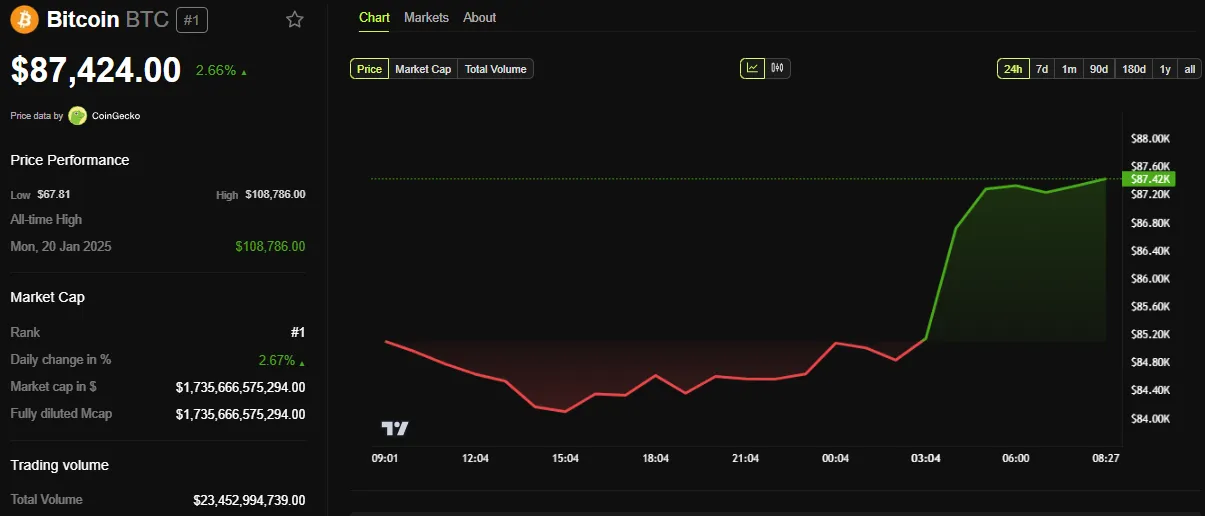
BeInCrypto data shows Bitcoin (BTC) was trading for $87,424 as of this writing. This represents a modest 2.66% gain in the last 24 hours.
Disclaimer
In adherence to the Trust Project guidelines, BeInCrypto is committed to unbiased, transparent reporting. This news article aims to provide accurate, timely information. However, readers are advised to verify facts independently and consult with a professional before making any decisions based on this content. Please note that our Terms and Conditions, Privacy Policy, and Disclaimers have been updated.
-

 Market24 hours ago
Market24 hours agoDogecoin Defies Bullish Bets During Dogeday Celebration
-

 Market22 hours ago
Market22 hours agoWill XRP Break Support and Drop Below $2?
-

 Bitcoin12 hours ago
Bitcoin12 hours agoUS Economic Indicators to Watch & Potential Impact on Bitcoin
-
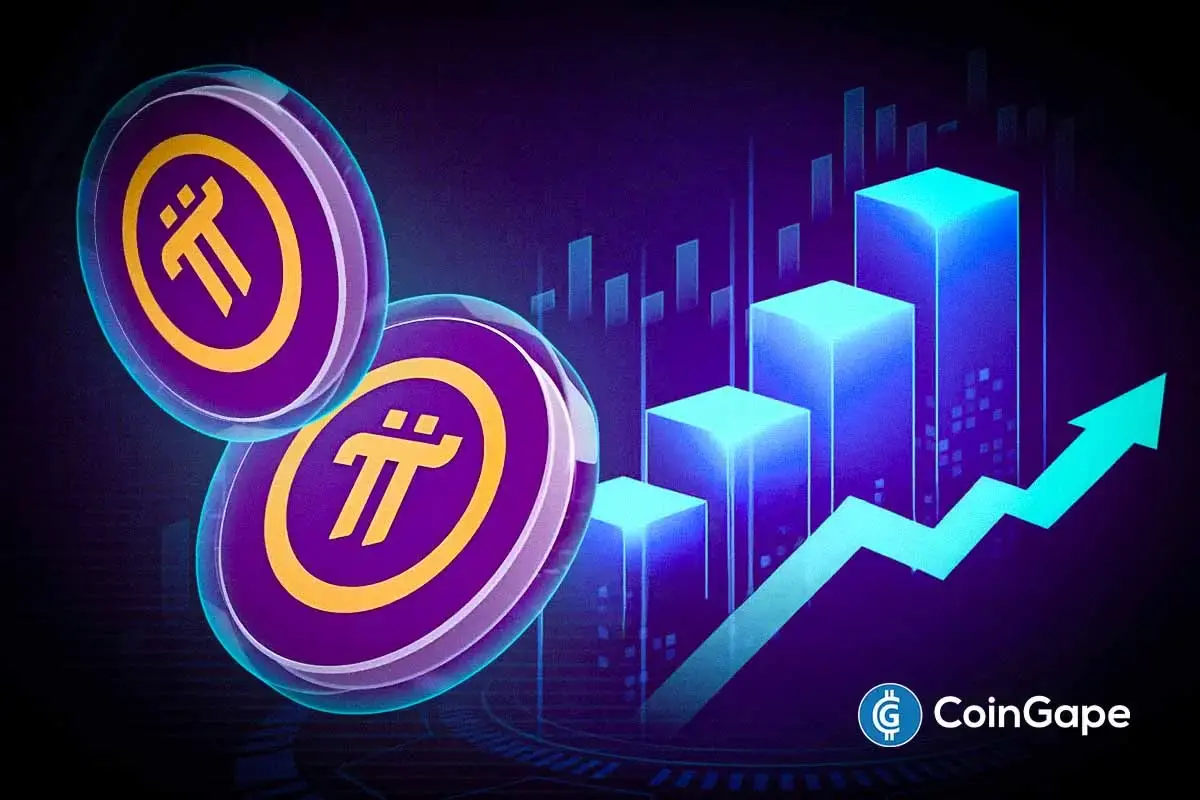
 Altcoin24 hours ago
Altcoin24 hours agoExpert Predicts Pi Network To Reach $5 As Whales Move 41M Pi Coins Off Exchanges
-

 Bitcoin21 hours ago
Bitcoin21 hours agoBitcoin LTH Selling Pressure Hits Yearly Low — Bull Market Ready For Take Off?
-

 Market15 hours ago
Market15 hours agoBitcoin Price Breakout In Progress—Momentum Builds Above Resistance
-

 Bitcoin18 hours ago
Bitcoin18 hours agoHere Are The Bitcoin Levels To Watch For The Short Term
-

 Altcoin15 hours ago
Altcoin15 hours agoExpert Says Solana Price To $2,000 Is Within Reach, Here’s How


